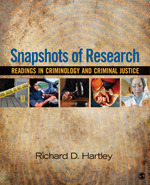Preface
Acknowledgments
1. The Scientific Method and the Research Process in Criminology and Criminal Justice
2. Criminological Theory and the Scientific Method
Reconsidering the Effect of Self-Control and Delinquent Peers: Implications of Measurement for Theoretical Significance
Ryan C. Meldrum, Jacob T. N. Young, and Frank M. Weerman
An Evaluation of the Assumptions That Underlie Institutional Anomie Theory
Mitchell B. Chamlin and John K. Cochran
An Assessment of Scales Measuring Constructs in Tests of Criminological Theory Based on National Youth Survey Data
Todd A. Armstrong, Daniel R. Lee, and Gaylene s. Armstrong
3. Ethics in the Research Process
The Ethics and Law of Confidentiality in Criminal Justice Research: A Comparison of Canada and the United States
J. Lowman and T. Palys
Combining Ethical Considerations With Recruitment and Follow-Up Strategies for Partner Violence Victimization Rsearch
TK Logan, R. Walker, L. Shannon, and J. Cole
4. Conceptualization and Measurement
Conceptualization of Terrorism
J. P. Gibbs
Measuring Victimization Inside Prisons: Questioning the Questions
N. Wolff, J. Shi, and R. Bachman
Theoretical and Methodological Issues in Racial Profiling Research
C. Batton and C. Kadleck
5. Sampling Procedures
Public Support for Getting Tough on Corporate Crime: Racial and Political Divides
J. D. Unnever, M. L. Benson, and F. T. Cullen
Gendered Opportunity? School-Based Adolescent Victimization
P. Wilcox, M. Skubak Tillyer, and B. S. Fisher
Public Awareness and Action Resulting From Sex Offender Community Notification Laws
A. L. Anderson and L. L. Sample
A Snowball's Chance in Hell: Doing Fieldwork With Active Residential Burglars
R. Wright, S. H. Decker, A.K.S. Redfern, and D. L. Smith
6. Experimental and Quasi-Experimental Research Designs
Randomized Experiments in Criminal Justice Policy: Prospects and Problems
D. Weisburd
A Quasi-Experimental Evaluation of Thinking for a Change: A "Real World" Application
C. T. Lowenkamp, D. Hubbard, M. D. Makarios, and E. J. Latessa
Applying Evidence-Based Practices to Community Corrections Supervision: An Evaluation of Residential Substance Aubse Treatment for High-Risk Probationers
D. M. Pérez
7. Survey Research and Interviews
Gang Intervention in Jails: A National Analysis
R. Ruddell, S. H. Decker, and A. Egley, Jr.
Insiders' Views of Prison Amenities: Beliefs and Perceptions of Correctional Staff Members
R. Tewksbury and E. E. Mustaine
Understanding the Black Box of Gang Organization: Implications for Involvement in Violent Crime, Drug Sales, and Violent Victimization
S. H. Decker, C. M. Katz, and V. J. Webb
Intimacy With Outlaws: The Role of Relational Distance in Recruiting, Paying, and Interviewing Underworld Research Participants
S. Jacques and R. Wright
8. Qualitative Research: Participant Observation, Focus Groups, and Case Studies
Covert Participant Observation: Reconsidering the Least Used Method
M. Miller
Fear of Gang Crime: A Qualitative Examination of the Four Perspectives
J. Lane
The Philosophical Versus Actual Adoption of Community Policing: A Case Study
A. T. Chappell
9. Unobtrusive Methods: Secondary Analysis, Content Analysis, Crime Mapping, and Meta-Analysis
Violent Girls or Relabeled Status Offenders? An Alternative Interpretation of the Data
B. C. Feld
Slain and Slandered: A Content Analysis of the Portrayal of Femicide in Crime News
R. Taylor
A Geographic Approach to Racial Profiling: The Microanalysis and Macroanalysis of Racial Disparity in Traffic Stops
S. Roh and M. Robinson
Does an Offender's Age Have an Effect on Sentence Length? A Meta-Analytic Review
J. Wu and C. Spohn
10. Mixed Methods Research
Problem-Oriented Policing and Open-Air Drug Markets: Examining the Rockford Pulling Levers Deterrence Strategy
N. Corsaro, R. K. Brunson, and E. F. McGarrell
The Impact of Occupational Culture on Drinking Behavior of Young Adults in the U.S. Navy
G. M. Ames, M. R. Duke, R. S. Moore, and C. B. Cunradi
11. Evaluation Research and Policy Analysis
Combating Methamphetamine Use in the Community: The Efficacy of the Drug Court Model
S. J. Listwan, D. K. Shaffer, and J. J. Hartman
Problem-Oriented Policing, Deterrence, and Youth Violence: An Evaluation of Boston's Operation Ceasefire
A. A. Braga, D. M. Kennedy, E. J. Waring, and A. Morrison Piehl
References
About the Author

